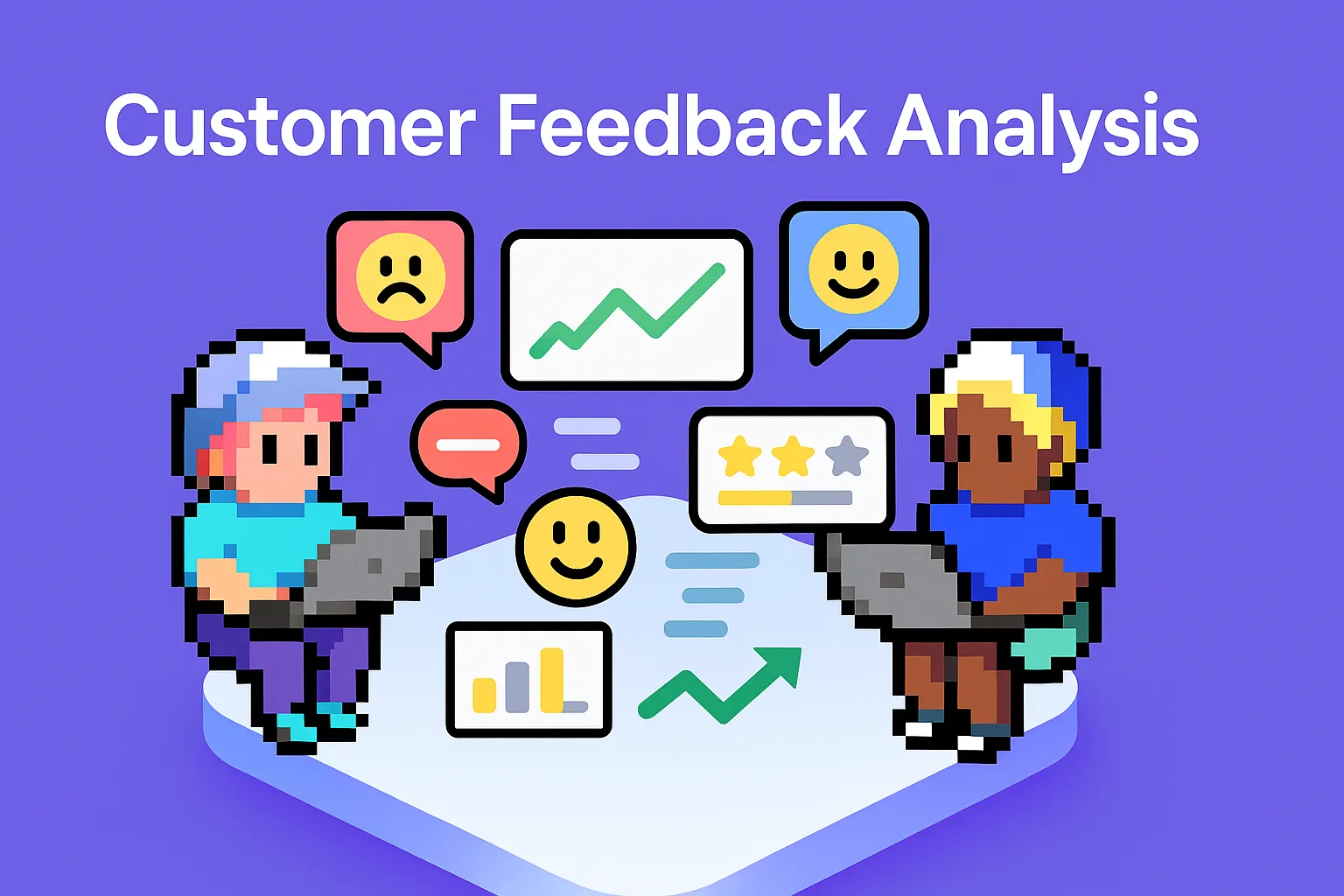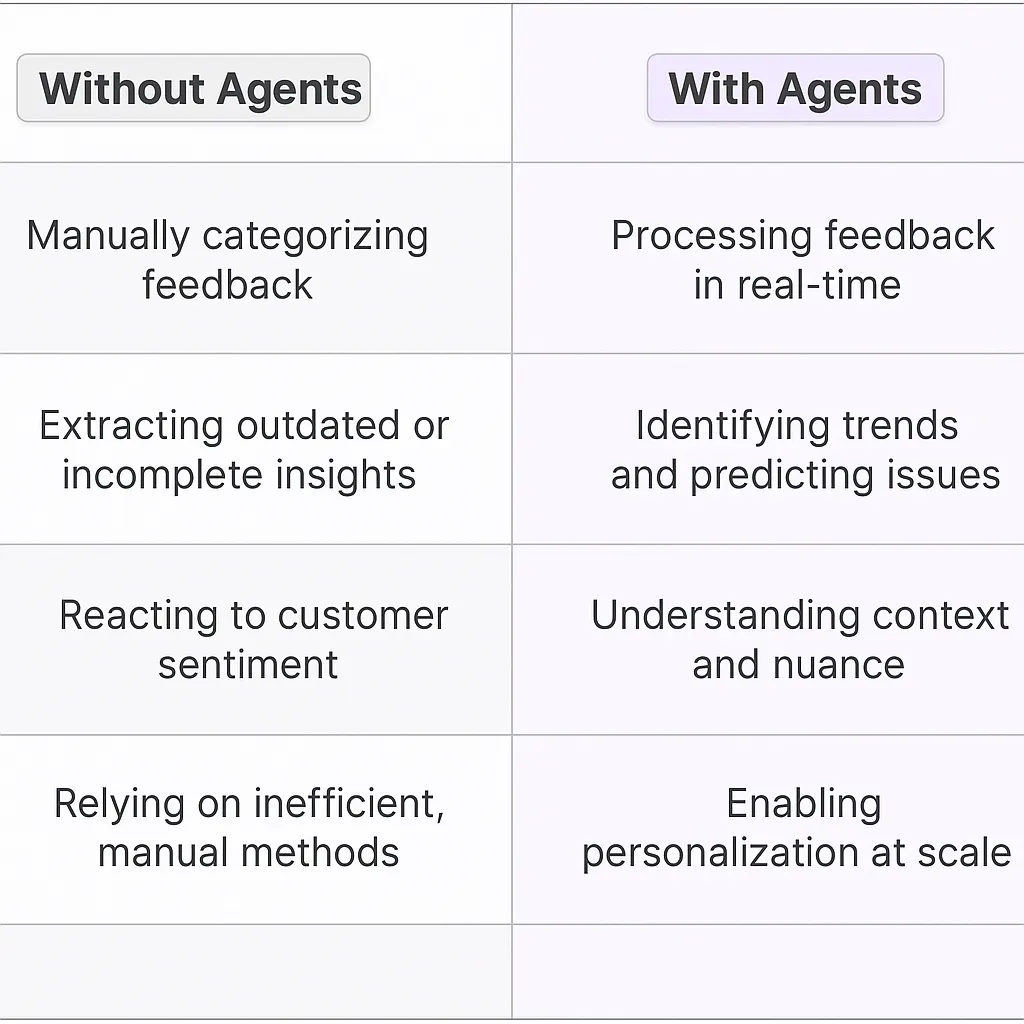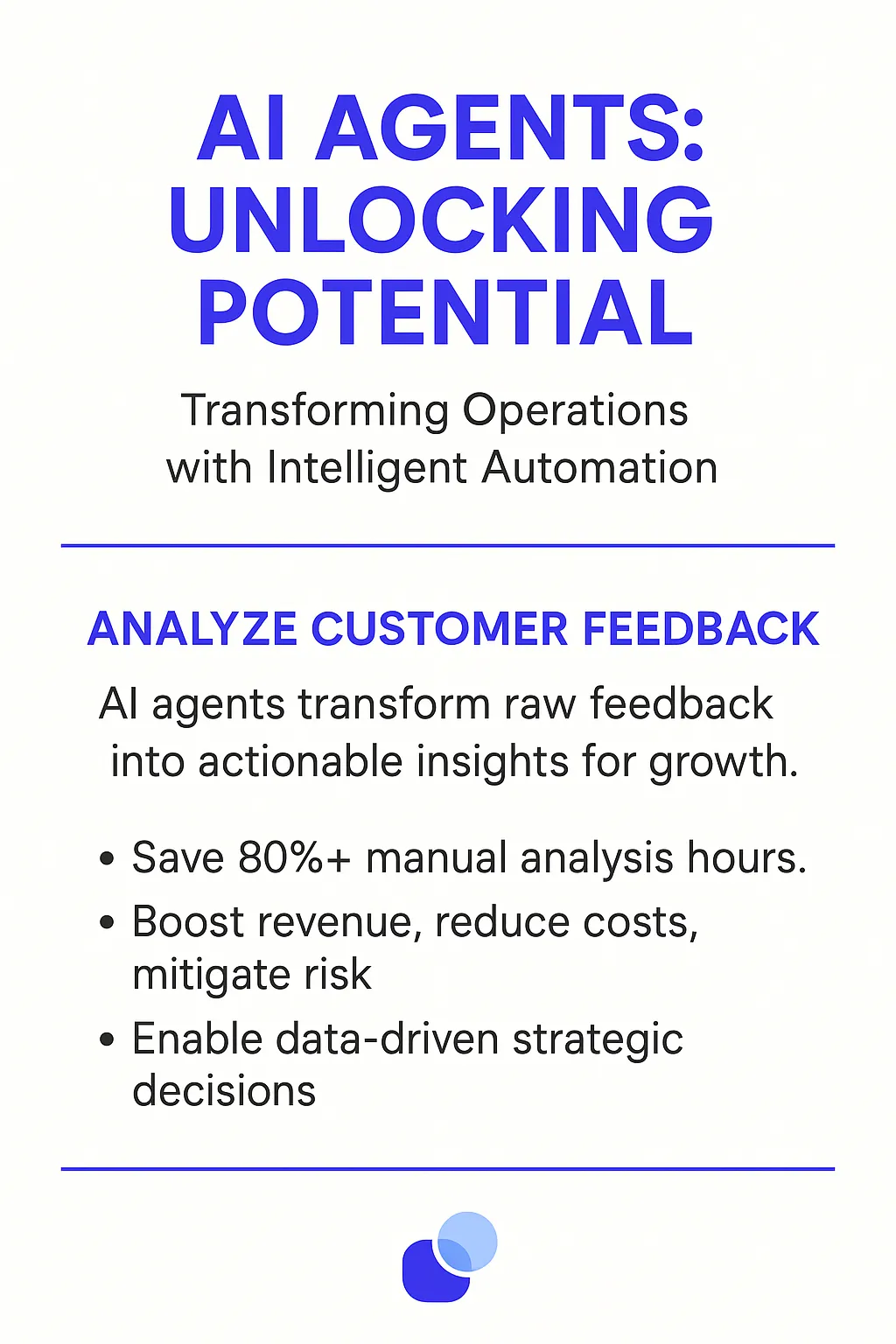Customer Feedback Analysis AI Agents
Understanding Customer Feedback Analysis in the AI Era
What is Customer Feedback Analysis?
Customer Feedback Analysis is the process of extracting meaningful insights from customer comments, reviews, and surveys. It's about understanding what your customers are saying, feeling, and thinking about your product or service. In the past, this was a manual, time-intensive process. Now, with AI agents, it's becoming a real-time, scalable operation that can handle millions of data points simultaneously.
Key Features of Customer Feedback Analysis
The key features of modern Customer Feedback Analysis powered by AI agents include:1. Real-time processing of vast amounts of feedback2. Sentiment analysis to gauge customer satisfaction3. Trend identification to spot emerging issues or opportunities4. Multi-source integration (social media, surveys, support tickets)5. Personalization at scale for targeted strategies6. Predictive analytics to forecast potential issues7. Continuous learning and improvement over timeThese features enable businesses to not just react to customer feedback, but to proactively shape their strategies based on deep, data-driven insights.

Benefits of AI Agents for Customer Feedback Analysis
What would have been used before AI Agents?
Before AI agents entered the scene, customer feedback analysis was a grueling, time-consuming process. Companies relied on teams of analysts poring over spreadsheets, manually categorizing feedback, and trying to extract meaningful insights from mountains of data. It was like trying to drink from a fire hose – overwhelming and inefficient.
The old methods often led to analysis paralysis. By the time insights were extracted, they were often outdated or incomplete. Companies were always playing catch-up, reacting to customer sentiment rather than proactively addressing issues.
What are the benefits of AI Agents?
AI agents for customer feedback analysis are game-changers. They're like having a team of tireless, hyper-intelligent analysts working 24/7 to uncover patterns and insights in your customer data.
First off, these digital teammates can process vast amounts of feedback in real-time. They're not just fast; they're insanely scalable. Whether you're dealing with 100 or 100,000 customer comments, AI agents can handle it without breaking a sweat.
But speed isn't everything. The real magic lies in their ability to understand context and nuance. These AI agents can detect sentiment, identify emerging trends, and even predict potential issues before they become full-blown crises. It's like having a crystal ball for customer satisfaction.
Moreover, AI agents excel at connecting dots across different data sources. They can integrate feedback from social media, support tickets, surveys, and more, giving you a holistic view of customer sentiment. This comprehensive analysis allows for more informed decision-making and strategy development.
Another killer feature? Personalization at scale. AI agents can segment customers based on their feedback and preferences, enabling hyper-targeted marketing and support strategies. It's like having a personal relationship manager for each of your customers, but without the astronomical costs.
Lastly, these AI agents are constantly learning and improving. They adapt to your specific business context, becoming more accurate and insightful over time. It's like having a digital teammate that gets smarter with every piece of feedback it processes.
In essence, AI agents for customer feedback analysis aren't just tools; they're transformative technologies that can give companies a serious competitive edge in understanding and serving their customers. They're turning the fire hose of customer feedback into a precise, powerful jet of actionable insights.

Potential Use Cases of AI Agents for Customer Feedback Analysis
Processes
Customer feedback analysis is a critical process for any business looking to improve its products or services. AI agents can transform this traditionally time-consuming task into a streamlined, data-driven operation. These digital teammates excel at parsing through vast amounts of unstructured data, identifying patterns, and extracting actionable insights.
One key process where AI agents shine is sentiment analysis. They can rapidly categorize feedback as positive, negative, or neutral, giving businesses a bird's-eye view of customer satisfaction. This process, which once required teams of analysts poring over countless comments, can now be automated and scaled to handle millions of data points.
Another crucial process is trend identification. AI agents can spot emerging issues or recurring themes in customer feedback that might escape human notice. This early warning system allows companies to address problems proactively, potentially turning detractors into promoters before negative sentiment spreads.
Tasks
When it comes to specific tasks, AI agents for customer feedback analysis are versatile powerhouses. They can tackle everything from basic data cleaning to complex predictive modeling. Here are some high-impact tasks these digital teammates can handle:
- Categorizing feedback by product, feature, or service area
- Identifying and flagging urgent issues that require immediate attention
- Summarizing long-form feedback into concise, actionable points
- Translating feedback from multiple languages for global businesses
- Generating custom reports tailored to different departments or stakeholders
- Correlating feedback data with other metrics like sales or customer retention
These AI agents aren't just about processing data faster; they're about unlocking insights that can drive real business value. By automating these tasks, companies can free up their human talent to focus on strategic decision-making and creative problem-solving.
The beauty of AI in customer feedback analysis is its ability to learn and improve over time. As these digital teammates process more data, they become increasingly adept at understanding context, detecting sarcasm, and even predicting future trends based on historical patterns.
For startups and scale-ups, leveraging AI for customer feedback analysis isn't just a nice-to-have – it's a competitive necessity. In a world where customer experience can make or break a business, having AI agents that can rapidly turn feedback into actionable insights is like having a superpower. It's not about replacing human intuition, but rather augmenting it with data-driven precision.
The companies that will win in the next decade are those that can listen to their customers at scale, understand the signals in the noise, and act on insights faster than their competitors. AI agents for customer feedback analysis are the key to unlocking this capability, turning the firehose of customer data into a focused stream of business intelligence.

Industry Use Cases for Customer Feedback Analysis AI Agents
The versatility of AI agents in customer feedback analysis makes them valuable across various industries. Let's dive into some meaty, industry-specific use cases that showcase how AI can transform workflows and processes.
These digital teammates aren't just fancy chatbots - they're sophisticated tools that can crunch through mountains of customer data, extract meaningful insights, and help businesses make smarter decisions. Think of them as your company's secret weapon for understanding what customers really want, not just what they say they want.
From e-commerce giants to mom-and-pop shops, businesses of all sizes are tapping into the power of AI to decode customer sentiment. It's like having a team of expert analysts working 24/7, but without the need for coffee breaks or vacation time.
So, let's roll up our sleeves and explore how different industries are leveraging these AI agents to turn customer feedback into actionable gold. Whether you're in tech, retail, healthcare, or any other sector, there's probably a use case here that'll make you sit up and take notice.
Retail Revolution: Customer Feedback Analysis AI in Action
The retail industry is ripe for disruption, and Customer Feedback Analysis AI agents are leading the charge. These digital teammates are transforming how retailers understand and respond to their customers' needs, creating a feedback loop that's both immediate and actionable.
Take a major clothing retailer like Zara. They're drowning in customer feedback from social media, online reviews, and in-store surveys. Traditionally, parsing through this data was a Herculean task, often resulting in delayed responses and missed opportunities. Enter the Customer Feedback Analysis AI agent.
This AI doesn't just skim the surface; it dives deep into the nuances of customer sentiment. It can detect subtle shifts in brand perception, identify emerging trends, and even predict future customer behaviors. For Zara, this means they can spot a viral TikTok fashion trend before it hits the mainstream, adjust their inventory in real-time, and even influence their design process for upcoming collections.
But it's not just about reacting to trends. These AI agents are proactive. They can identify customers at risk of churning based on their feedback patterns and trigger personalized retention campaigns. They can spot quality issues in specific product lines before they become widespread problems, potentially saving millions in recalls and reputation damage.
The real game-changer is how these AI agents democratize customer insights across the organization. No longer is customer feedback siloed in the customer service department. Now, everyone from the C-suite to the store manager has access to real-time, actionable insights. This creates a customer-centric culture that permeates every aspect of the business.
In the cutthroat world of retail, where margins are thin and competition is fierce, Customer Feedback Analysis AI agents aren't just nice to have – they're becoming essential for survival. They're the secret weapon that allows retailers to stay one step ahead of customer expectations, turning feedback into a competitive advantage.
Hospitality Reinvented: Customer Feedback AI Transforms Guest Experiences
The hospitality industry is undergoing a seismic shift, and Customer Feedback Analysis AI agents are at the epicenter. These digital teammates are redefining how hotels and resorts understand and cater to their guests, creating a feedback loop that's not just reactive, but predictive and transformative.
Consider a luxury hotel chain like Four Seasons. They're inundated with guest feedback from multiple touchpoints - social media, online reviews, in-room surveys, and direct staff interactions. Traditionally, making sense of this data was like trying to drink from a fire hose. But with Customer Feedback Analysis AI, they're turning this deluge into a strategic advantage.
These AI agents don't just count stars or tally complaints. They're parsing the subtleties of guest sentiment, identifying micro-trends, and even anticipating future guest preferences. For Four Seasons, this means they can detect an uptick in requests for plant-based dining options before it becomes a mainstream demand, adjust their menus in real-time, and even influence their culinary training programs.
But here's where it gets really interesting. These AI agents are becoming proactive guest experience managers. They can identify guests who might be at risk of having a subpar stay based on their feedback patterns and trigger personalized recovery actions. Imagine a guest who's mentioned a noisy air conditioner and a slow room service experience. The AI can flag this to the hotel staff, who can then surprise the guest with a room upgrade or a complimentary spa treatment, turning a potential negative review into a loyalty-building moment.
The real power move is how these AI agents are democratizing guest insights across the entire organization. Guest feedback is no longer trapped in the front desk's inbox. Now, everyone from the CEO to the housekeeping staff has access to real-time, actionable insights. This creates a guest-centric culture that permeates every aspect of the hotel experience.
In the hyper-competitive world of hospitality, where a single bad review can cost thousands in lost bookings, Customer Feedback Analysis AI agents aren't just a nice-to-have - they're becoming as essential as clean sheets and hot water. They're the secret sauce that allows hotels to not just meet guest expectations, but to consistently exceed them, turning each stay into a memorable experience that guests can't wait to repeat and share.
Considerations
Technical Challenges
Implementing a Customer Feedback Analysis AI Agent isn't a walk in the park. It's more like trying to teach a robot to understand sarcasm – possible, but fraught with complexities.
First off, natural language processing (NLP) is still a beast to tame. Customers don't speak in binary; they use slang, idioms, and context-dependent expressions. Your AI needs to be smart enough to parse "This product is the bomb!" as a compliment, not a security threat.
Then there's the data quality issue. Customer feedback comes in all shapes and sizes – from structured surveys to free-form rants on social media. Cleaning and normalizing this data is like trying to organize a teenager's room. It's messy, time-consuming, and you're never quite sure if you've got it all.
Scalability is another technical hurdle. As your business grows, so does the volume of feedback. Your AI agent needs to handle this increasing load without breaking a sweat or, more importantly, without breaking the bank in compute costs.
Operational Challenges
On the operational side, integrating an AI agent into existing workflows is like trying to introduce a vegan to a steakhouse – there's bound to be some friction. Teams accustomed to manual analysis might resist the change, fearing job obsolescence or distrusting the AI's capabilities.
Training the AI is another operational headache. It needs a constant diet of high-quality, diverse data to improve its accuracy. This means dedicating resources to data curation and annotation – a task that's about as exciting as watching paint dry, but crucial nonetheless.
Privacy and compliance issues also rear their ugly heads. With regulations like GDPR and CCPA, your AI agent needs to be a privacy ninja, processing sensitive customer data without running afoul of the law. It's like trying to gossip without naming names – tricky, but necessary.
Lastly, there's the challenge of actionability. An AI that spits out insights is cool, but one that drives meaningful action is golden. Figuring out how to translate AI-generated insights into concrete business decisions is the real game-changer. It's the difference between having a smart speaker that can tell you the weather and one that knows when to remind you to bring an umbrella.
Implementing a Customer Feedback Analysis AI Agent is no small feat. It's a complex dance of technology, operations, and strategy. But for those who can pull it off, the rewards – deeper customer understanding, faster response times, and data-driven decision making – are well worth the effort. It's not just about building a smarter business; it's about creating a more customer-centric one.
Embracing AI for Customer-Centric Business Transformation
Customer Feedback Analysis AI Agents are more than just a technological advancement - they're a paradigm shift in how businesses understand and respond to their customers. These digital teammates are turning the firehose of customer data into a focused stream of actionable intelligence, enabling companies to make faster, smarter decisions.
The impact of these AI agents extends far beyond just processing feedback faster. They're enabling a level of customer understanding that was previously impossible, allowing businesses to predict trends, personalize at scale, and proactively address issues before they become problems.
As we move into an increasingly data-driven future, the companies that will thrive are those that can effectively harness the power of AI to truly listen to their customers. Customer Feedback Analysis AI Agents aren't just tools - they're becoming essential partners in building customer-centric, responsive, and ultimately more successful businesses.
The future of customer feedback analysis is here, and it's powered by AI. The question isn't whether businesses will adopt these technologies, but how quickly they'll do so to stay ahead in an increasingly competitive landscape.













